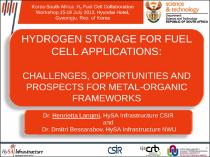 ResearchSpace
ResearchSpace
Hydrogen storage for fuel cell applications: Challenges, opportunities and prospects for metal-organic frameworks
JavaScript is disabled for your browser. Some features of this site may not work without it.
- ResearchSpace
- →
- Research Publications/Outputs
- →
- Conference Publications
- →
- View Item
| dc.contributor.author |
Langmi, Henrietta W

|
|
| dc.contributor.author |
Bessarabov, D

|
|
| dc.date.accessioned | 2013-10-23T12:14:50Z | |
| dc.date.available | 2013-10-23T12:14:50Z | |
| dc.date.issued | 2013-07 | |
| dc.identifier.citation | Langmi, H.W. and Bessarabov, D. 2013. Hydrogen storage for fuel cell applications: Challenges, opportunities and prospects for metal-organic frameworks. In: Korea-South Africa Hydrogen Fuel Cells Collaboration Workshop, Gyeongju, South Korea, 15-18 July 2013 | en_US |
| dc.identifier.uri | http://hdl.handle.net/10204/7003 | |
| dc.description | Korea-South Africa Hydrogen Fuel Cells Collaboration Workshop, Gyeongju, South Korea, 15-18 July 2013 | en_US |
| dc.description.abstract | Safe, efficient hydrogen storage and distribution is widely regarded as one of the major challenges facing the transition to the Hydrogen Economy. Conventionally, hydrogen is stored as compressed gas or cryogenically as a liquid. In order to meet future targets, particularly for on-board applications, hydrogen needs to be stored in a safe and compact manner by combining the gas with other materials either chemically or physically. A plethora of studies have focused on developing a wide variety of different classes of candidate materials such as metal hydrides, complex hydrides, chemical carriers, and microporous materials. Research efforts are directed towards enhancing hydrogen storage capacity, thermodynamics and kinetics of hydrogen uptake and release, and cycle life of the materials. In the past decade, there has been growing interest in metal organic frameworks (MOFs) as hydrogen storage materials and significant progress has been made in this regard. The challenges, opportunities and prospects for this rapidly growing class of crystalline materials for hydrogen storage will be presented. | en_US |
| dc.language.iso | en | en_US |
| dc.relation.ispartofseries | Workflow;11573 | |
| dc.subject | Metal-organic frameworks | en_US |
| dc.subject | Hydrogen storage | en_US |
| dc.subject | HySA Infrastructure | en_US |
| dc.title | Hydrogen storage for fuel cell applications: Challenges, opportunities and prospects for metal-organic frameworks | en_US |
| dc.type | Conference Presentation | en_US |
| dc.identifier.apacitation | Langmi, H. W., & Bessarabov, D. (2013). Hydrogen storage for fuel cell applications: Challenges, opportunities and prospects for metal-organic frameworks. http://hdl.handle.net/10204/7003 | en_ZA |
| dc.identifier.chicagocitation | Langmi, Henrietta W, and D Bessarabov. "Hydrogen storage for fuel cell applications: Challenges, opportunities and prospects for metal-organic frameworks." (2013): http://hdl.handle.net/10204/7003 | en_ZA |
| dc.identifier.vancouvercitation | Langmi HW, Bessarabov D, Hydrogen storage for fuel cell applications: Challenges, opportunities and prospects for metal-organic frameworks; 2013. http://hdl.handle.net/10204/7003 . | en_ZA |
| dc.identifier.ris | TY - Conference Presentation AU - Langmi, Henrietta W AU - Bessarabov, D AB - Safe, efficient hydrogen storage and distribution is widely regarded as one of the major challenges facing the transition to the Hydrogen Economy. Conventionally, hydrogen is stored as compressed gas or cryogenically as a liquid. In order to meet future targets, particularly for on-board applications, hydrogen needs to be stored in a safe and compact manner by combining the gas with other materials either chemically or physically. A plethora of studies have focused on developing a wide variety of different classes of candidate materials such as metal hydrides, complex hydrides, chemical carriers, and microporous materials. Research efforts are directed towards enhancing hydrogen storage capacity, thermodynamics and kinetics of hydrogen uptake and release, and cycle life of the materials. In the past decade, there has been growing interest in metal organic frameworks (MOFs) as hydrogen storage materials and significant progress has been made in this regard. The challenges, opportunities and prospects for this rapidly growing class of crystalline materials for hydrogen storage will be presented. DA - 2013-07 DB - ResearchSpace DP - CSIR KW - Metal-organic frameworks KW - Hydrogen storage KW - HySA Infrastructure LK - https://researchspace.csir.co.za PY - 2013 T1 - Hydrogen storage for fuel cell applications: Challenges, opportunities and prospects for metal-organic frameworks TI - Hydrogen storage for fuel cell applications: Challenges, opportunities and prospects for metal-organic frameworks UR - http://hdl.handle.net/10204/7003 ER - | en_ZA |





